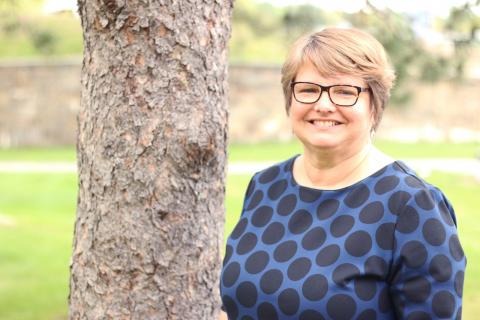Donovan Receives Northeast Excellence in Extension Award

Molly Donovan, a UNH Extension community and economic development state specialist, received the Northeast Regional Award for Excellence in Extension from the Association of Public and Land Grant Universities (APLU) earlier this month. UNH Extension Dean and Director Ken La Valley accepted the award on Donovan’s behalf at APLU’s annual meeting in New Orleans.
The APLU awards committee praised Donovan’s work with “citizen volunteers and leaders to build resilient communities and a strong economy” in New Hampshire cities and towns.
“She specializes in community engagement—bringing everyone into local decision-making—as a way to strengthen ideas, make change, and build leadership. Her area of expertise has been community development practice with a focus on community engagement,” the committee said. “She developed and teaches in the Community Engagement Academy, designed to train a new generation of leaders in a broad array of engagement tools and a focus on under-represented audiences. She is an expert in community development practice including leadership development, needs assessment, engagement, action planning, and evaluation. She is working on revitalization efforts in New Hampshire’s small downtowns.”
Earlier this year, Donovan was awarded the University of New Hampshire Presidential Award of Excellence. She has a bachelor’s degree from Canisius College and a master’s degree from the State University of New York at Buffalo.
“Molly is the go-to person when municipalities and organizations have questions related to community development because they all recognize that she can effectively mobilize campus resources. She is trusted, valued as an expert and is a critical resource to the state,” said Charlie French, Extension’s community and economic development program team leader.
Donovan’s community development work with the city of Franklin is just one example of her innovative spirit and tireless efforts, French added.
“By leveraging resources from the local, state and national levels, Molly and team launched a process that engaged diverse voices, including new immigrants, senior citizens with limited income, individuals and families seeking affordable housing and other diverse groups,” he said. “The project resulted in Franklin identifying ways to improve the downtown, catalyze new businesses, create new jobs, and develop workforce housing for over 45 low-income families.”